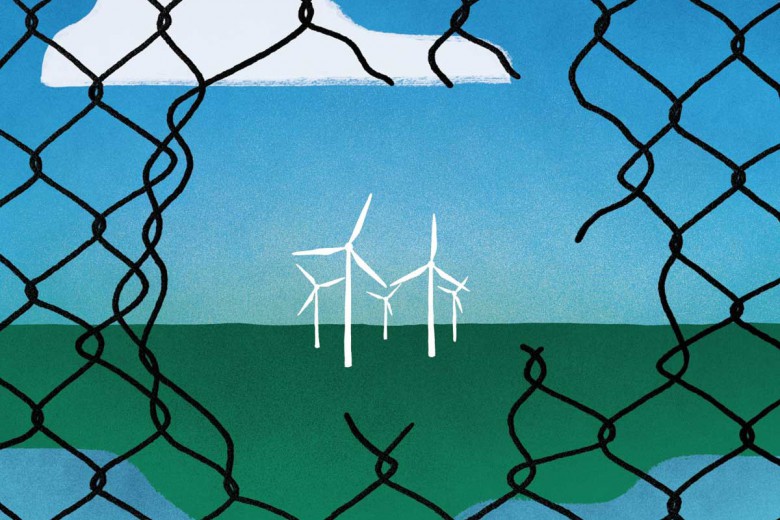Lire la version française ici.
It was underground, in the catacomb-like basement of a former industrial building, where the Quebec Movement for a Convivial Degrowth (MQDC: le Mouvement québécois pour une décroissance conviviale) was founded in 2007. The meeting brought together 30 or so people – environmentalists, anti-capitalists, anti-globalization activists, and intellectuals – all of whom had signed the recently published Manifeste pour une décroissance conviviale.
Three decades earlier, European philosophers André Gorz and Jacques Grinevald were the first to use the word “décroissance” in the way we understand it today. But their call for a radical downscaling of production and consumption didn’t gain traction back then, in the context of the economic recession that followed the 1979 oil crisis, and the neoliberal policies of the 1980s. Talk of degrowth was drowned out by appeals for “sustainable development,” a reformist program aggressively promoted by major international institutions, including the United Nations.
The idea of degrowth was revived early in the new millennium, first in France, particularly by the work of economist Serge Latouche. At that time, Vincent Cheynet and Bruno Clémentin, two anti-advertising activists, also coined the phrase “décroissance soutenable” – sustainable degrowth – in response to the rhetoric around sustainable development, which they saw as a dead end – at best a bid to “pollute less in order to pollute longer.”
Initially the term “degrowth” was a “missile word” deployed to explode the belief that human progress, in the Global North as much as in the Global South, depends on continued economic growth. But while it was simply a provocative slogan at the outset, the idea of degrowth began to generate interest. Activists formed groups, wrote books and articles, and organized lectures and conferences. The degrowth movement grew – in France, but also in other parts of Latin Europe such as Spain, Italy, the French-speaking part of Switzerland, and the Wallonia region of Belgium. It is in part because of the deep connection between France and Quebec – based on, among other things, a shared language and a considerable number of French immigrants to Quebec – that degrowth has garnered much more support in Quebec than in the rest of Canada and the U.S.
Why object to growth?
The idea of degrowth put forward by the MQDC is very close to the one that dominates in France. It is based on a three-pronged critique of growth.
First, our societies must exit the race for economic growth before degrowth is forcibly and brutally imposed on us by our planet’s biophysical limits. We cannot go on producing ever more stuff without using ever more natural resources and generating ever more waste. So-called renewable resources are only renewable up to a point; there are no substitutes for breathable air, potable water, and fertile land. And the capacity of the planet’s ecosystems to assimilate our waste is not unlimited.
Second, the break with growth is also necessary because economic growth creates major social and environmental injustices, both within nations and between them. While economic growth has never been stronger globally than since the 1950s, a 2013 United Nations Development Programme (UNDP) report observed: “Over the last two decades, income inequality has been growing on average within and across countries. […] The world is more unequal today than at any point since World War II.” As the economist Thomas Piketty has shown, except under exceptional circumstances like war or economic depressions, growth tends to increase the inequalities between income from capital and income from labour.
Third, the pursuit of growth must be abandoned because it reduces us all to cogs in the technical and economic macrosystems which underpin it. Having become “the tools of our tools,” to borrow a phrase from Henry David Thoreau, we simply no longer have the opportunity to decide how we live together. These decisions are now largely determined by economic and technical imperatives over which even the most powerful politicians have no real control. The dependence of our societies on fossil fuels, for example, dictates a need to wage war in distant lands or destroy vast territories to secure our supply of oil.
Initially the term “degrowth” was a “missile word” deployed to explode the belief that human progress depends on continued economic growth.
Degrowth is thus necessary not only to stop the ecological crisis, but to address the injustices of capitalism. This radical idea of degrowth must be distinguished from the Anglo-American liberal-inspired idea of degrowth developed by such economists as Herman Daly (famous for his defence of the “steady-state economy”), Peter Victor, and Tim Jackson. These scholars do not call into question our society’s main social institutions such as private property and profit-seeking corporations. By contrast, the vision of degrowth à la française which informs the thinking of the MQDC is more overtly anti-capitalist and draws inspiration from socialist thinkers – primarily Marx, but also more recent left social theorists like Cornelius Castoriadis and André Gorz. It is a revolutionary program, a call to liberate ourselves from the capitalist growth imperative and build more sustainable, just, and democratic societies.
There are similarities between degrowth and eco-socialism – the latter as formulated by John Bellamy Foster, Michael Löwy, Joel Kovel, and Daniel Tanuro, among others. Both offer radical critiques of contemporary society from anti-capitalist and ecological perspectives. But eco-socialism has two major flaws from the vantage point of degrowth, or at least of the French wing of the movement. First, degrowth supporters point to eco-socialism’s blind spot with regard to the political problems of technoscience. They maintain that many industrial techniques which were developed with the help of modern science threaten to destroy individual and collective autonomy, regardless of the prevailing political arrangements. Second, eco-socialism generally looks to the state as an indispensable lever in carrying out the revolutionary project, whereas advocates of degrowth favour revolution “from below” in a way that brings it closer to the anarchist tradition.
Despite their differences, however, eco-socialism and degrowth agree on the most essential point: the refusal of productivism and the exploitive relations that undergird it. As a result, they both criticize reformist political proposals that continue to put forward economic growth as a necessary condition of human progress – including the ideology of sustainable development, and the Green New Deal project promoted by U.S. Democrats.
The degrowth project
The degrowth movement has no turnkey social project to pitch. But its adherents agree on the general contours a transition to a post-growth society should take: produce less, share more, and make genuinely democratic decisions about how we should live together. These principles could be implemented, first, by relocalizing the production of the goods and services we require with the aim of self-production. Such a shift would ideally be orchestrated by municipalities governed and federated according to the principles of direct democracy. We would need to rely on Low Tech, that is, methods of production controlled by users and adapted to locally available resources, particularly with regards to energy. All of this would be based on the restoration and creation of the commons – self-managed collectives whose members equitably share the means of production (land, tools, knowledge, etc.).
The strength of this kind of project is that we don’t have to wait for a revolutionary situation to begin implementing it. The commons are already blooming a little all over the place. Montreal, for example, is home to dozens of what could be deemed degrowth initiatives, such as the Milton-Parc housing co-operative; the Bâtiment 7 local services centre; the La Remise tool library; the Champ des Possibles, a self-managed community garden, and UPop Montreal, a free People’s University. And there are many other projects being built, all with the same goal of reclaiming our autonomy from a macro-economic and technological system that subordinates us in the name of growth. The challenge is to multiply these initiatives and build networks to link them up, seeking support from existing government agencies where possible. It is through these efforts that the critical mass needed to transform society from the ground up can be obtained.
When the MQDC was formed its main objective was to introduce and promote the idea of degrowth in public discourse in Québec. More specifically, the group aimed to create a point of convergence for struggles against social injustice, ecological destruction, and the domination of our lives by the economy and technoscience. The critique of growth serves to highlight the intersections of these diverse struggles and provides the basis of a common worldview. It was with this in mind that the founding members organized study groups, workshops, public lectures and seminars that brought together activists and scholars. Several multi-author books were published, as well as a quarterly print newspaper, L’Objecteur de Croissance. This intellectual effort laid the groundwork for one of my own contributions to fulfilling the original MQDC mission: the creation of the first university course on degrowth in Canada, which continues to be taught at HEC Montréal.
The strength of this kind of project is that we don’t have to wait for a revolutionary situation to begin implementing it.
Apart from a few symbolic protests against the pollution of public space by advertising and the Formula 1 Grand Prix race in Montreal, MQDC members have not initiated new projects on the ground. Instead they have chosen to support existing efforts that resonate with a degrowth perspective. They have, for instance, joined protests against the extraction and transportation of fossil fuels, tax havens, war, and tuition fee hikes. The MQDC also considered it more strategic to create a degrowth group inside Québec solidaire, the most left-wing party represented in Quebec’s National Assembly, rather than form a new degrowth party. Admittedly, these decisions were also dictated by the movement’s limited membership which, until recently, had never exceeded a few hundred people. Still, it reflects the desire, first and foremost, to create links between diverse struggles.
MQDC members did discuss the question of whether the group should undertake concrete projects based on degrowth principles. But the majority of members thought it wiser to take part in and promote existing initiatives which were in harmony with the goal of moving towards a post-growth society. The MQDC has organized joint activities with the Réseau québécois pour la simplicité volontaire, a group devoted to promoting voluntary simplicity, and a local Transition Towns initiative.
The work of the MQDC is currently on hold, but its founding members are collaborating with a new group, Décroissance conviviale au Québec, which has taken up the torch. Last October they organized a very successful Degrowth Festival, which enjoyed unprecedented media coverage. It featured lectures, workshops, film screenings, and tours of collective gardens. It seems that the various manifestations of climate disruption across the Global North in the summer of 2018 in addition to the shocking resignation, at the end of August, of France’s Environment Minister Nicolas Huot, sparked renewed interest in degrowth. The second edition of the festival, scheduled for June 1 in Montreal, will be an opportunity to build on this momentum.
This article was translated from French by Andrea Levy.




_780_520_90_s_c1_c_c.jpg)


